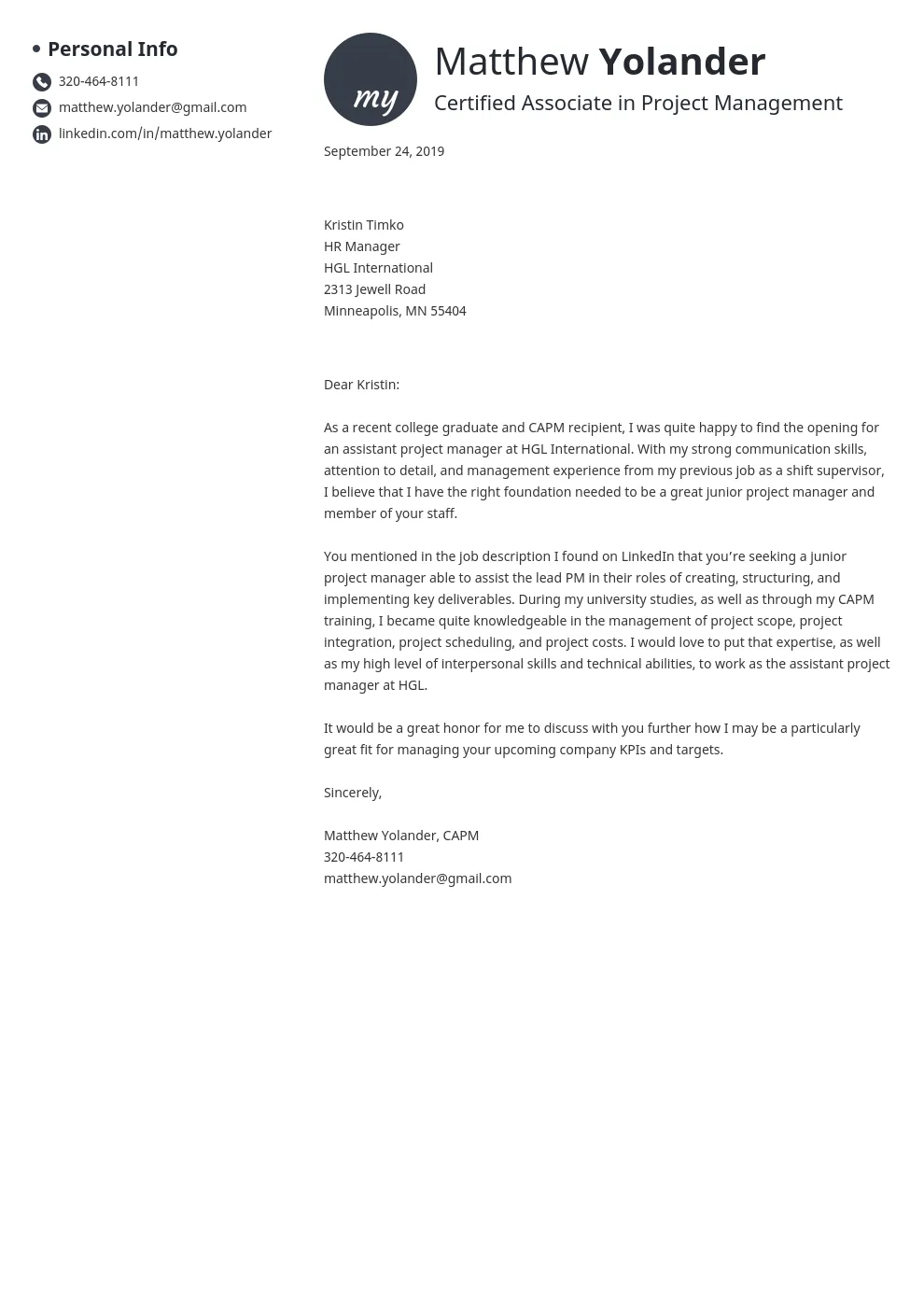The Importance of a Project Manager Cover Letter
In the competitive world of project management, a well-crafted cover letter is your initial handshake with a potential employer. It’s not merely a formality, but a crucial opportunity to make a strong first impression and distinguish yourself from other applicants. Your cover letter provides a space to showcase your personality, passion for project management, and how your specific skills and experience align with the job requirements. A compelling cover letter can be the deciding factor in whether your resume even gets a second look. It’s your chance to tell a story, illustrating your value proposition beyond the bullet points of your resume and highlighting your unique qualifications for the role.
What to Include in Your Project Manager Cover Letter
A project manager cover letter should be a concise yet comprehensive document, focusing on the most relevant aspects of your skills and experience. Start by addressing the hiring manager by name, if possible, as this demonstrates that you’ve done your research and are genuinely interested in the position. Briefly introduce yourself and state the specific role you are applying for. Then, delve into what makes you the ideal candidate. This involves highlighting both your technical and soft skills, quantifying your achievements, and demonstrating how your experience aligns with the job’s requirements. Conclude with a strong call to action, expressing your enthusiasm for the opportunity and your availability for an interview.
Highlighting Your Project Management Skills
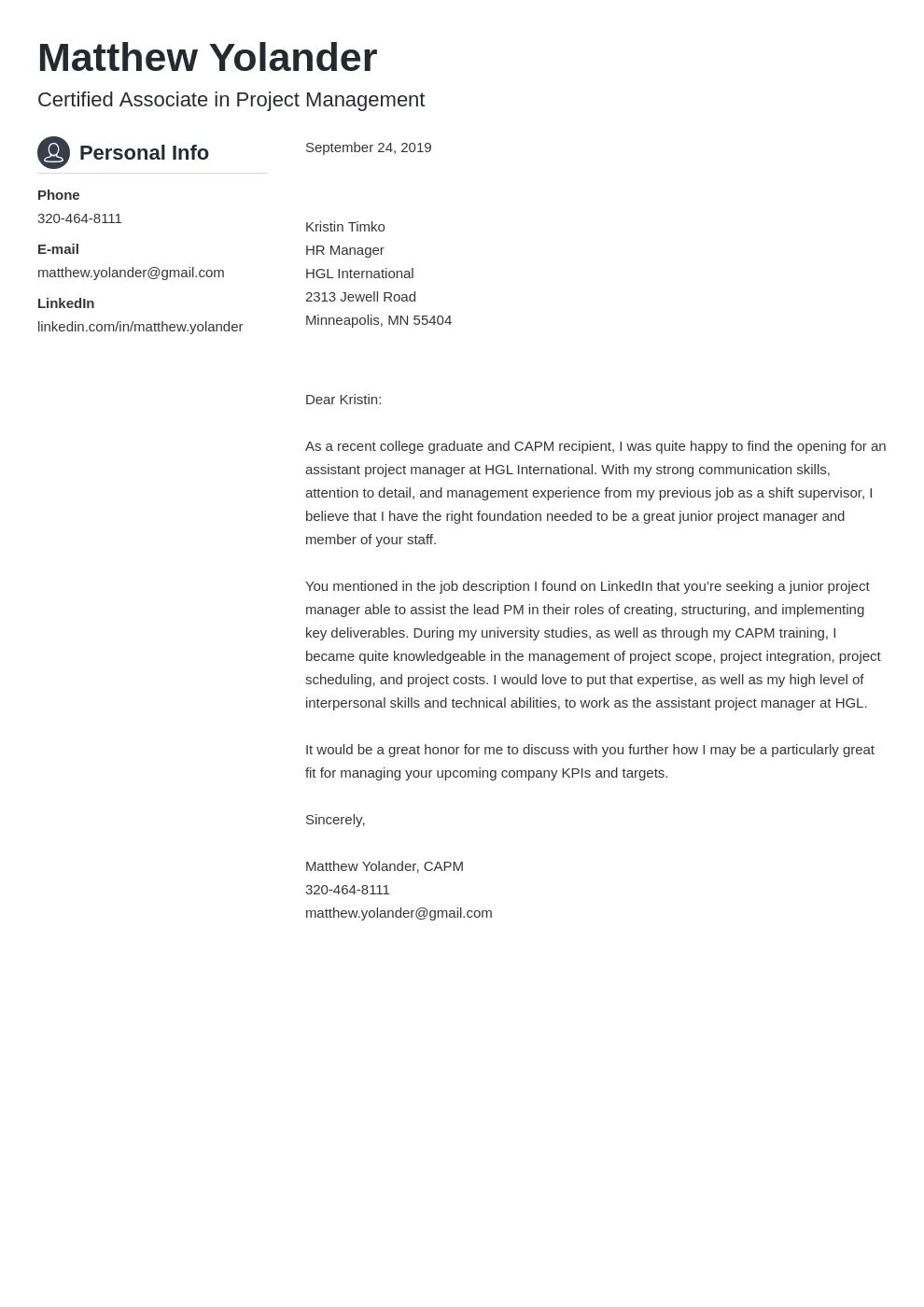
Project management is a multifaceted discipline, so it’s important to showcase the breadth of your skills. This involves demonstrating both your technical and soft skills. Technical skills are the tangible, measurable abilities you possess, while soft skills relate to your interpersonal and communication abilities. Both types of skills are essential for a project manager’s success and should be highlighted according to the specific requirements of the role. Remember to provide specific examples of how you have utilized these skills in previous projects to illustrate your capabilities and success.
Technical Skills
Technical skills form the foundation of your project management prowess. These skills are often the qualifications listed on the job description, so make sure you highlight all the skills that overlap with the requirements, such as proficiency in project management methodologies (Agile, Scrum, Waterfall), experience with project management software (Asana, Jira, Microsoft Project), budget management, risk management, and resource allocation. If the role requires specific technical knowledge, such as IT infrastructure or software development, be sure to mention those as well, showcasing your expertise.
Soft Skills
Soft skills are essential for effective project leadership and team management. Include skills like leadership, communication (written and verbal), conflict resolution, negotiation, problem-solving, and time management. Show how you have used these skills to motivate teams, manage stakeholder expectations, and successfully deliver projects within budget and on schedule. Showcase skills in adapting to change, working under pressure, and maintaining a positive attitude, which can be crucial in a fast-paced project management environment.
Quantifying Your Achievements
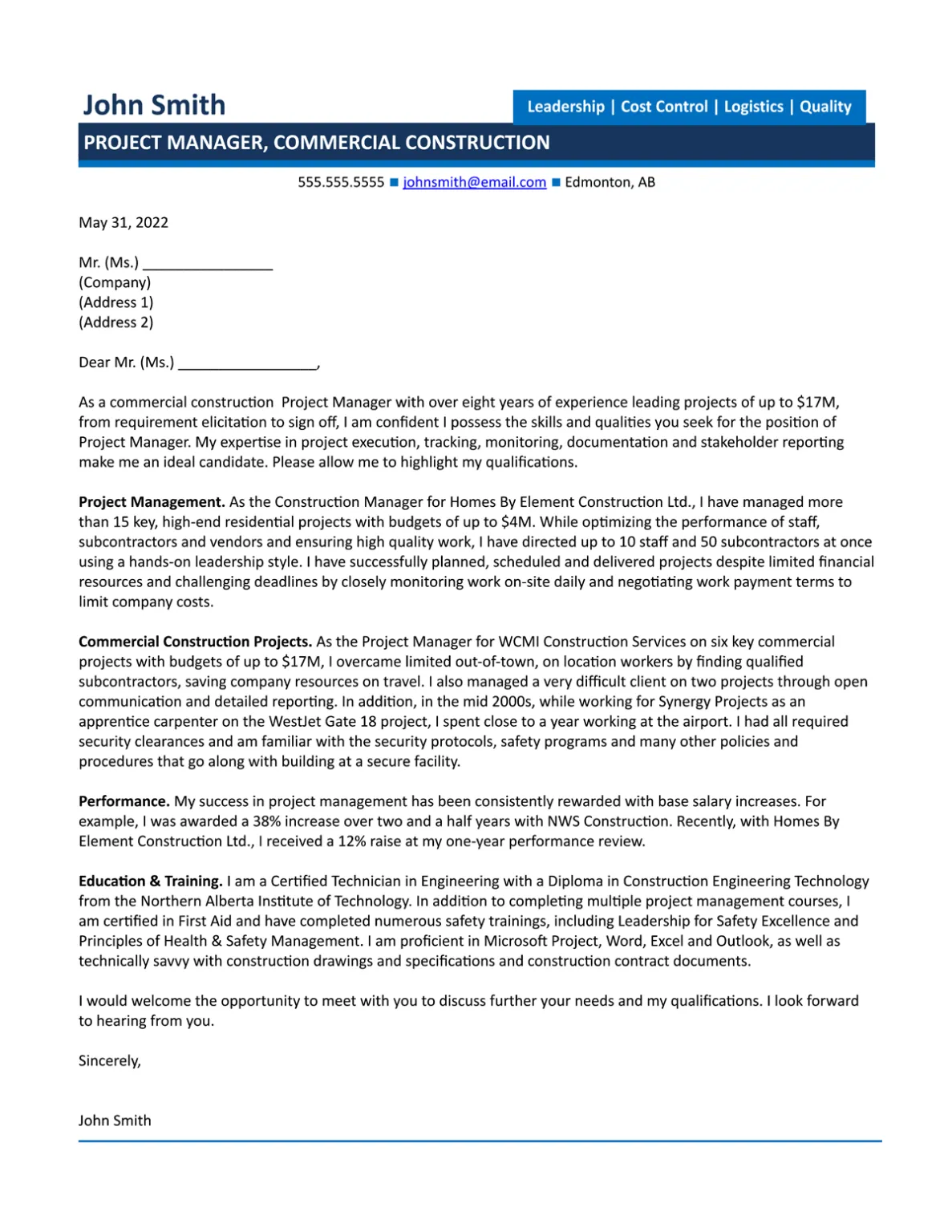
Instead of just listing your responsibilities, use your cover letter to showcase your accomplishments. Use measurable data to illustrate your impact. This is the most effective way to prove your value to the potential employer. Using quantifiable metrics helps the hiring manager to easily understand your value. Be specific in your examples.
Using Numbers to Showcase Impact
Numbers speak volumes. Instead of saying you ‘improved project efficiency,’ say you ‘reduced project completion time by 15%.’ Instead of saying you ‘managed a large budget,’ state the actual budget amount and any cost savings you achieved. Include these statistics to demonstrate your achievements clearly and concisely. These numbers will make your cover letter stand out from the crowd, making your accomplishments more memorable and impactful.
Providing Specific Examples
Don’t just state you have experience with risk management; provide a specific example of a risk you identified, the steps you took to mitigate it, and the outcome. When describing your project management experience, provide a concise overview of the project, your role, the challenges you faced, and the results you achieved. Specific examples demonstrate your ability to put your skills into practice and achieve tangible results. It makes your cover letter compelling and memorable to the hiring manager.
Tailoring Your Cover Letter to the Job
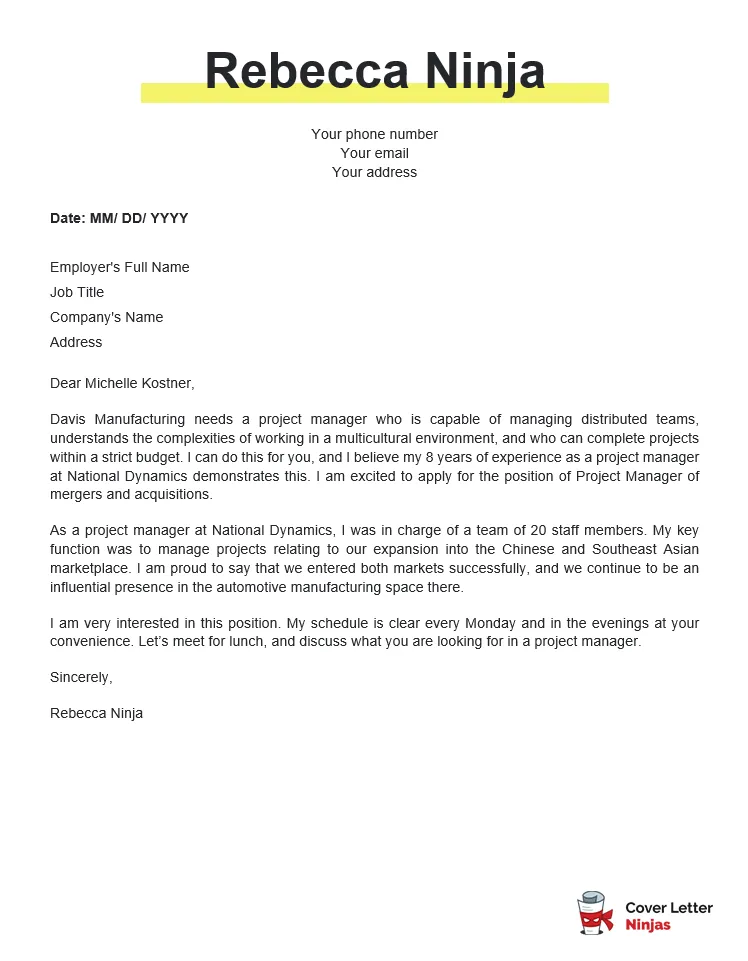
The best cover letters are tailored to each specific job application. This means customizing your letter to align with the specific requirements outlined in the job description. This demonstrates that you have taken the time to understand the needs of the role and are not just sending out a generic application. This small effort shows that you genuinely want the job and are willing to tailor your skills to their specific needs.
Researching the Company and Role
Before you begin writing, thoroughly research the company, the industry, and the specific role. Understand the company’s mission, values, and recent projects. Review the job description meticulously and identify the key skills and experience they are looking for. Use this information to tailor your cover letter, emphasizing how your skills and experience align with their requirements and how you can contribute to their goals. Demonstrating a clear understanding of the company and role shows you are not only qualified but also genuinely interested in the opportunity.
Matching Skills and Requirements
Once you have researched the company and role, map your skills and experience to the requirements listed in the job description. Prioritize the skills that are most relevant and essential to the position. Use the same keywords and phrases from the job description to demonstrate your understanding of their needs. Then, provide specific examples of how you have used these skills to achieve success in past projects. This direct alignment will make your cover letter highly relevant and significantly increase your chances of getting an interview.
Formatting and Tone Best Practices
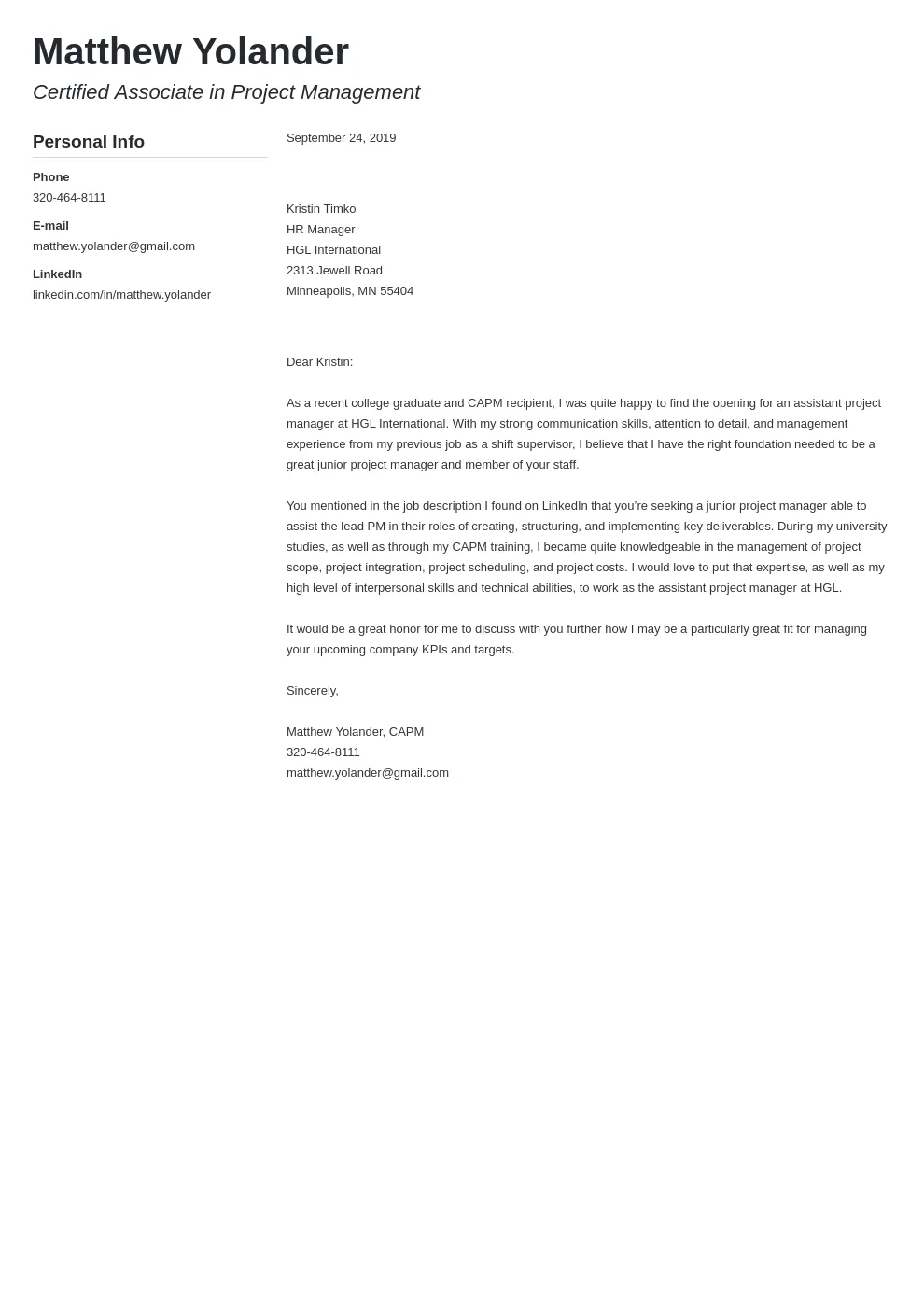
Presentation matters. A professionally formatted cover letter, free of errors and with a clear tone, demonstrates your attention to detail and respect for the potential employer. Choose a professional font, maintain consistent formatting throughout the document, and ensure your writing is clear and concise.
Professional Formatting
Select a clean, professional font such as Arial, Calibri, or Times New Roman. Use a standard font size (11 or 12 points) for readability. Use clear headings and subheadings to organize your content. Keep your paragraphs short and to the point, using bullet points to highlight your key skills and achievements. Ensure your cover letter is free of typos and grammatical errors by proofreading carefully or having someone else review it.
Choosing the Right Tone
The tone of your cover letter should be professional, enthusiastic, and confident. Show your personality while maintaining a respectful and formal tone. Express your interest in the role and company genuinely, and let your passion for project management shine through. Demonstrate confidence in your abilities, but avoid arrogance. Your goal is to show the hiring manager that you are a good fit.
Common Mistakes to Avoid
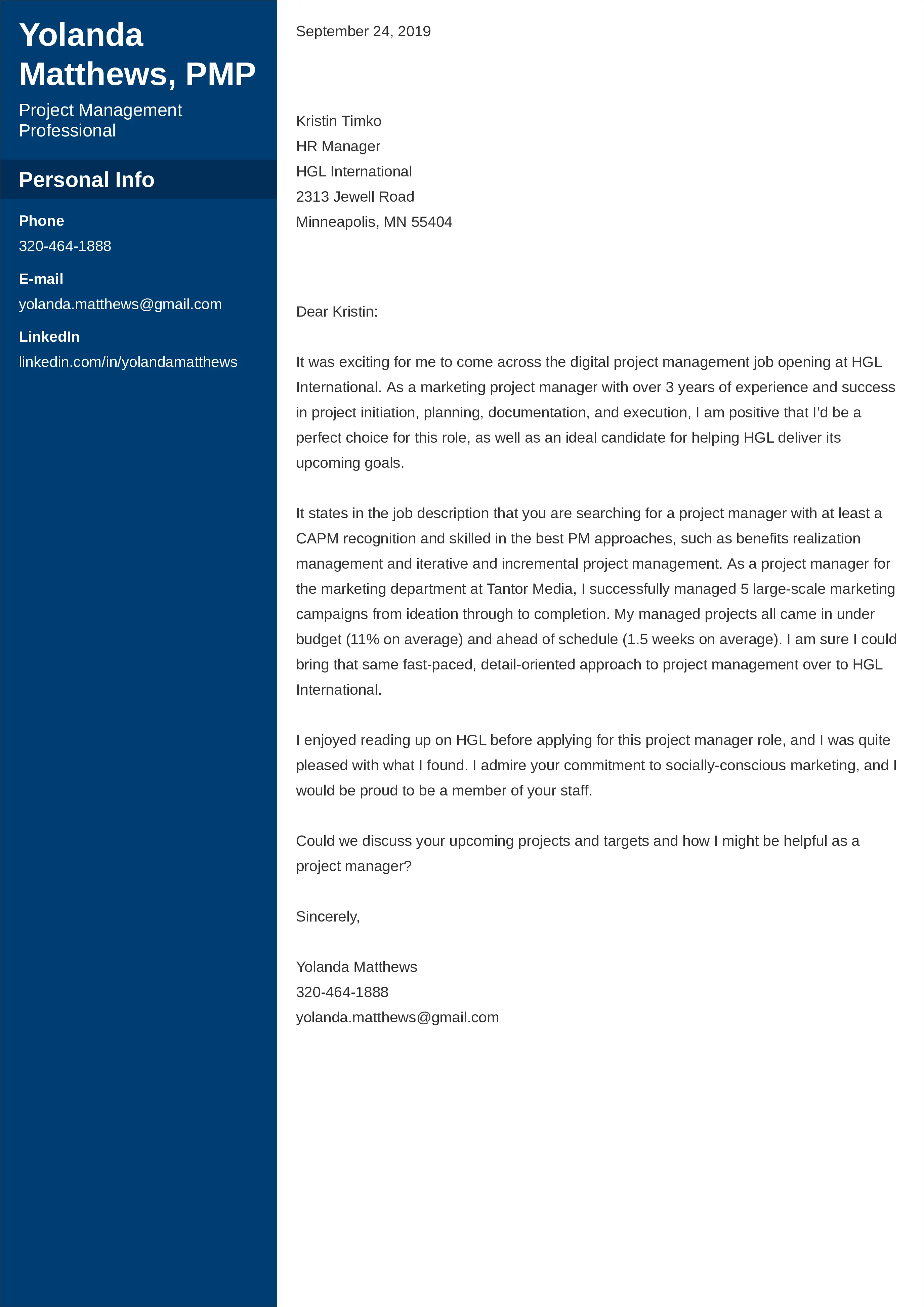
Certain mistakes can significantly undermine your chances of securing an interview. Avoiding these common pitfalls is essential for creating a cover letter that impresses the hiring manager. Here are some of the most critical errors to avoid when writing your project manager cover letter.
Generic Cover Letters
Using a generic cover letter that isn’t tailored to the specific job is a major mistake. These letters lack the specific information about the role, company, and your skills. They often sound impersonal and demonstrate a lack of effort. Always customize your cover letter for each job application, demonstrating that you are specifically interested in the opportunity and that you have the relevant skills to succeed. Demonstrate that you have researched the company and understand its needs. A personalized approach greatly increases your chances of getting an interview.
Focusing on “I” Instead of “You”
While it’s necessary to highlight your skills and experience, a cover letter that is overly focused on “I” can appear self-centered. You must highlight the benefit you bring to the employer. Instead of saying “I managed projects,” say “Managed projects, delivering them on time and under budget, which resulted in…” This approach shifts the focus to the employer’s needs and demonstrates how you can contribute to their success. Focus on what you can do for the company rather than just listing your achievements.
Typos and Grammatical Errors
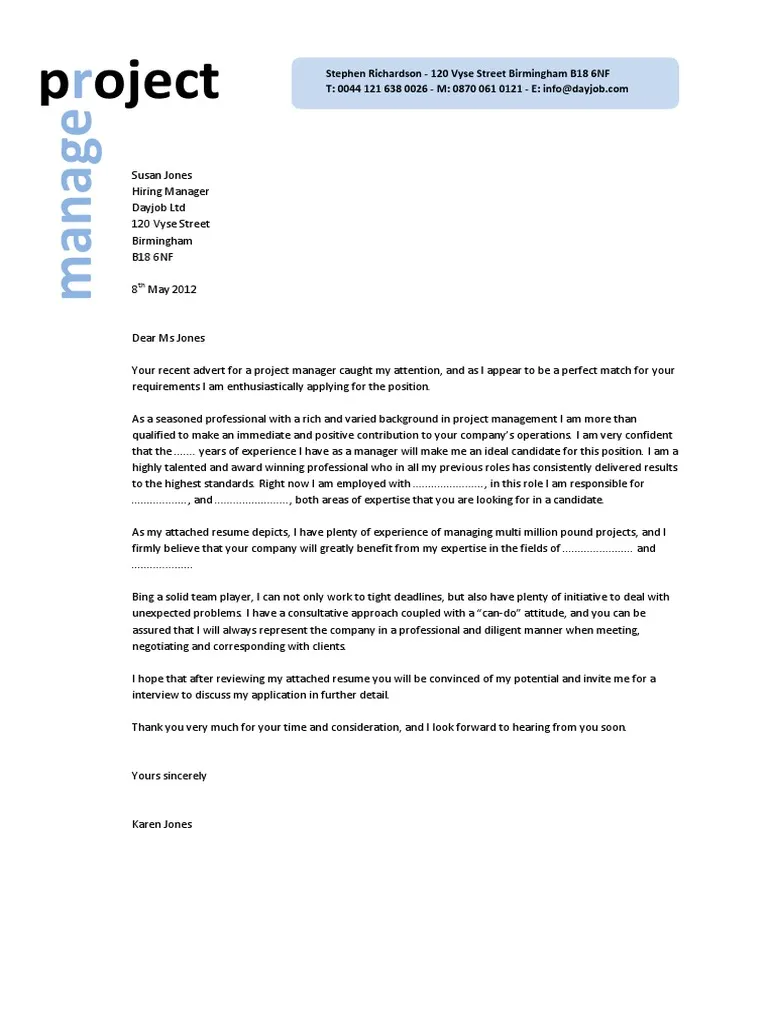
Typos and grammatical errors are an instant turnoff. They demonstrate a lack of attention to detail, which is critical for a project manager. Always proofread your cover letter carefully. Use a grammar and spell-checking tool, and, ideally, have a friend or colleague review your cover letter to catch any errors you might have missed. A polished, error-free cover letter reflects professionalism and demonstrates your commitment to excellence.
The Perfect Closing
The closing of your cover letter is your final opportunity to make a positive impression. Express your enthusiasm for the opportunity and reiterate your interest in the role. Include a clear call to action, such as stating your availability for an interview. Thank the hiring manager for their time and consideration. Provide your contact information and any other relevant details. A well-crafted closing strengthens your application and leaves the hiring manager with a positive impression of your capabilities.
